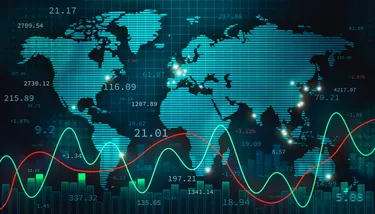
It can be easy to forget, as you're monitoring the U.S. financial markets, that there's a global economy that impacts everyone. Events on the other side of the world can hit your bank account, even if the effects aren't immediate. When this happens, you can see price hikes and supply shortages that force you to put a hold on making certain purchases.
What Is the Global Economy?
Video of the Day
Different areas of the world operate on different economic systems. Some governments have a free market, for instance, while others are centrally planned, otherwise known as "command economies." But for the supply chain to work as efficiently as possible, it's important for various countries to come together in a global economy.
Video of the Day
Globalization allows countries to trade internationally, which creates an additional source of income. Chances are, you use things every day that came from another country. Even if something is manufactured in the United States, component parts likely come from other countries. China is a big exporter of the components used in smartphones and vehicles, for instance.
Supply and Demand
As great as globalization can be for individual economies, it can be problematic. When the world depends on a particular item, one issue can impact a larger percent of the global population.
The supply chain is set up to meet global demand, with manufacturers regularly creating enough supply to fulfill that demand. Manufacturers also keep an eye on the supply chain to make sure they aren't overproducing. If, for example, component manufacturers see a slowdown in the technology products being generated, they might pull back on production to avoid excessive inventory.
National Events and Globalization
Occasionally, a major event happens that can put a wrinkle in the supply chain. Any act of terrorism can break down the supply chain temporarily. The terrorist event with the biggest impact was the September 11, 2001, attack, which cost the global economy an estimated $40.6 billion.
Massive health crises can also hit the global economy, as everyone has seen during the COVID-19 pandemic. Early on, a variety of factors contributed to a toilet paper and paper towel shortage in some countries, forcing manufacturers to shift production to meet the sudden change in the supply chain. There is still a worldwide shortage of microchips as a result of factories shutting down to reduce spread of the virus.
Consider also: The Microchip Shortage & Your Budget
Transportation and Globalization
All material goods must be shipped after they're purchased, whether it's electronics, textiles, steel or another type of export. For overseas shipments, this is often done by water, which can eliminate the types of risks that affect air cargo.
But shipping vessels aren't completely immune. Recently, a China port shutdown due to COVID-19 outbreaks set off fears that worldwide shortages would result. When a container ship got stuck in the Suez Canal in the spring, it brought attention to how often that particular emergency takes place. Approximately 12 percent of all world trade volume passes through the Suez Canal.
Adjusting to Supply Chain Shortages
Realizing that disruption can occur in the supply chain is only part of the problem. The world will always depend on raw materials to make finished goods, and those materials, if not the goods themselves, will come from other parts of the world. So it's important that manufacturers be able to scale quickly as demands change.
Consider also: The Microchip Shortage & Your Budget
A good example of this is the automaker supply chain shifts that are happening in light of the component and material shortages. But changing the way goods are made takes time, so it's important for all manufacturers to have a backup plan. As a consumer, the best thing you can do is hold off on purchasing until supply meets demand and prices start going down.
Although globalization isn't failproof, it does give individual economies a chance to expand their distribution outside their own geographic area. Try as they might, manufacturers will never be able to quickly adjust to all emergencies, so it's key that consumers scale back purchases when supply doesn't meet demand and prices start to skyrocket.
- Cambridge Dictionary: The Global Economy
- De Gruyter: The Economic Impact of Terrorism from 2000 to 2018
- New Scientist: There's a Global Shortage of Computer Chips – What's Causing It?
- The Journal of Commerce Online: Ningbo Terminal Shutdown Fuels Fears of China Port Congestion Spread
- NIKKEI Asia: Ningbo Terminal Shutdown Fuels Fears of China Port Congestion Spread
- Automotive Logistics: Material Shortages Are Forcing a Supply Chain Rethink in Automotive